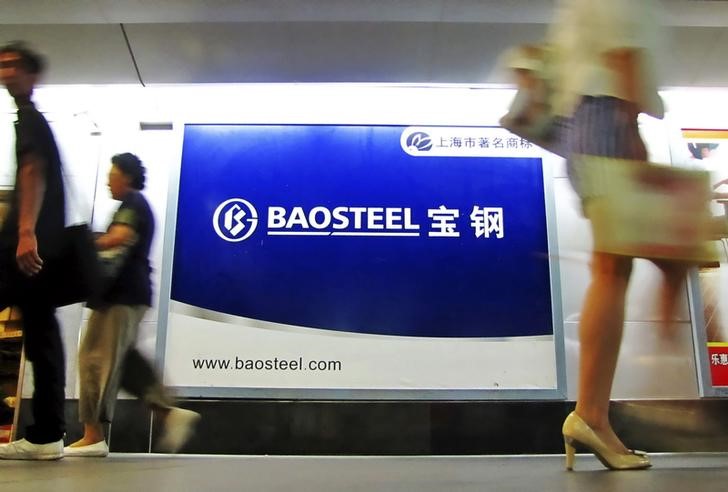By David Stanway and Ruby Lian
BEIJING/SHANGHAI (Reuters) - China's top listed steelmaker Baosteel <600019.SS> expects output this year to rise about 20 percent, even as the country steps up efforts to slash a huge overcapacity that has boosted cheap exports and caused some producers elsewhere to shut.
The announcement by Baoshan Iron and Steel Co Ltd, or Baosteel, comes a day after India's Tata Steel (NS:TISC) put its British operations up for sale, blaming the move that leaves thousands of jobs at risk on a flood of cheap Chinese supplies.
China has been aggressively shipping out surplus steel and selling them, according to other producing nations, at unfairly low prices. Exports hit a record 112 million tonnes in 2015.
"Of course China is the epicentre where they're exporting at predatory pricing to almost all countries," Seshagiri Rao, joint managing director at India's JSW Steel Ltd (NS:JSTL) said on what was behind the distressed global steel industry.
China makes half of the world's steel and produced 803.8 million tonnes in 2015. That was almost eight times the output of Japan, the No. 2 producer, and nearly 20 times Germany's.
China's production capacity is far bigger, at 1.2 billion tonnes, and is expected to further increase this year, according to the China Iron and Steel Association.
Baosteel's huge Zhanjiang steel production base with an annual capacity of about 9 million tonnes and which it calls its "dream factory" goes into operation later this year, its board secretary Zhu Kebing said on Thursday.
Baosteel, the listed arm of China's No. 2 steel producer - the Shanghai-based Baosteel Group, is likely to produce 27.1 million tonnes of crude steel this year versus 22.6 million tonnes in 2015, Zhu said.
"As a result of the completion of main production lines at the Zhanjiang project in 2016, the scale of the company's output will show an increase," he said.
WEAK STEEL PRICES HIT EARNINGS
But Zhu said Chinese steel prices, currently near decade-lows, are expected to remain weak.Last year marked the first drop in China's steel output since 1981 as producers responded to shrinking domestic demand in an economy that grew at its slowest pace in 25 years.
Because Chinese mills can sell their products cheap, exports rose, leading to complaints of dumping from other countries.
In February, European Union regulators opened three anti-dumping investigations into Chinese steel products and imposed new duties on imports.
Beijing has said anti-dumping measures to limit its exports will not address trade tensions in the sector, with authorities later blaming the pains of the global steel industry to a weak economy and shrinking competitiveness.
"Today Chinese steel companies, for every tonne of steel they export, they lose $102 per tonne," said JSW's Rao, citing industry data. China's steel exports eased only 1.3 percent over January-February from a year earlier.
The plunge in steel prices has hit producers' earnings. Baosteel posted an 82.5 percent slump in 2015 net profit to 1.013 billion yuan ($156.70 million), while others such as Maanshan Iron and Steel <600808.SS>, Hunan Valin Steel <000932.SZ> and Angang Steel Co <000898.SZ>, also saw losses.
With China's steel capacity surplus at around 400 million tonnes and average utilisation rates under 70 percent, Beijing is aiming to shut around 100-150 million tonnes of capacity in the next five years.
Local governments are now working on how to divide closure targets among producers, Baosteel's Zhu said.
"Looking over the long term, China's steel demand has already hit a peak and some capacity needs to be withdrawn from the market, or merged and restructured, and this will benefit the company by raising our market value," he added.

($1 = 6.4644 Chinese yuan)
(Writing and additional reporting by Manolo Serapio Jr in Manila, reporting by Ruby Lian in Shanghai and David Stanway in Beijing; Editing by Himani Sarkar)